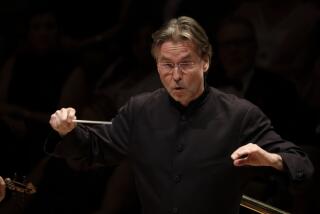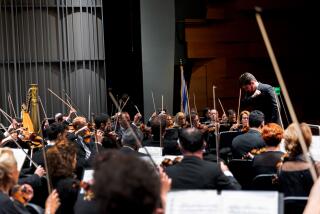A guiding force absent all too soon
MANY of us at Walt Disney Concert Hall on Tuesday night came to say goodbye to an indomitable spirit in the world of early music. The concert was a stop on the farewell tour of the German ensemble Musica Antiqua Koln, which is disbanding this month. Sadly, we were too late. The tour will continue to the bitter end, but the indomitable spirit is already history.
Reinhard Goebel is that spirit. When he founded the ensemble of period instruments with friends from the Cologne Conservatory of Music in 1973, the early music movement was mainly made up of nerdy scholars, nerdy pseudo-scholars and ultra-nerdy charter members of the Society for Creative Anachronism. When we were lucky, the music making was merely peculiar; when we weren’t, it was incompetent.
Goebel, however, was a flashy violinist with a sense of dramatic flair who gave the movement an audacious shot of adrenaline. He made Cologne a center for exciting early music performance. He made recordings that, when you turned them up loud, rocked.
In the early ‘90s, Goebel developed hand problems that forced him to relearn to play left-handed, a nearly impossible feat, and he came back more ferocious than ever. Ultimately, though, he couldn’t keep it up, and the band announced that this year would be its last. Then in August, Goebel found he could no longer play at all, so the tour continues without him, led by Ilia Korol, a capable but less colorful violinist from the ensemble.
Tuesday proved a reminder not only of what was once so special about Musica Antiqua Koln but also of why its day has passed. Goebel had a passion for discovery, and the program featured music from odd corners of the German Baroque.
There were two brief sonatas by Heinrich Bach, Johann Sebastian’s great-uncle, and a short vocal work by Heinrich’s son Johann Christoph. Johann David Heinichen, a Goebel find, was represented by an overture. Telemann made an appearance with a dreary septet. A Jan Dismas Zelenka motet ended things.
None of this could hold a candle to the short Bach cantata, No. 54 (“Widerstehe doch der Sunde”), that was the evening’s highlight. The guest vocalist was Marijana Mijanovic, a contralto with a dark, deep voice and a severe, scarily intense sense of drama. She sang without brightness but with brilliance.
In his cantata, Bach meant to make sinners quake in their boots -- the title translates as “Stand firm against transgression” -- and Tuesday’s performance was so unrelentingly horrific in its revelation of the suffering wrongdoing engenders that I wish the ensemble could stay together and perform it for the opening of the new Congress.
The cantata inspired by far the evening’s most impressive playing, with harshly percussive strings hammering home Bach’s message. For the blander music by Telemann, the elder Bachs and the pretty-good Heinichen, there was blander playing.
A pair of oboes and a jaunty bassoon did enliven the Heinichen. And a continuo of rich cello, bold violone (the forerunner of the double bass) and harpsichord gave all the evening’s music a good foundation (although the harpsichord was barely audible even in Disney).
For Zelenka’s motet, “Barbara dira effera,” the ensemble whipped up the kind of storm for which it is prized, while Mijanovic pealed forth exciting coloratura. But the music itself came perilously close to parody, at times sounding like P.D.Q. Bach without the punch lines.
Early music might not be so vital today if not for Musica Antiqua Koln. Its progeny include such German period instrument groups as Concerto Koln and Berliner Barock Solisten, which are now the lively, latest thing. And I’ll remember Tuesday’s farewell for the hell-raising Bach cantata. But it was a shame that the group couldn’t have gone out on a more elevated note overall.
More to Read
The biggest entertainment stories
Get our big stories about Hollywood, film, television, music, arts, culture and more right in your inbox as soon as they publish.
You may occasionally receive promotional content from the Los Angeles Times.











